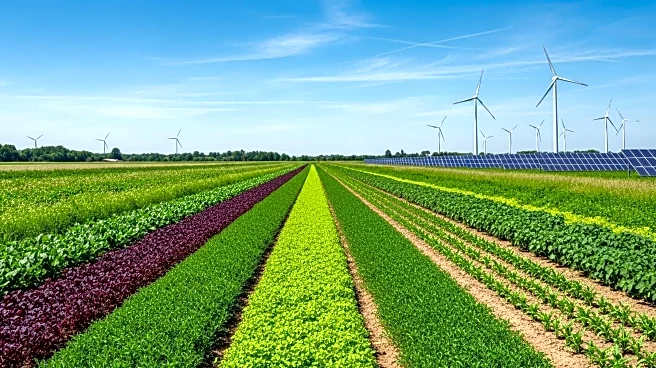What's Happening?
Australian agriculture is on track to reach a valuation of $94.7 billion by 2025-26, as reported by the Australian Bureau of Agricultural and Resource Economics and Sciences (ABARES). This progress is part of a broader goal to achieve a $100 billion valuation by 2030. The sector has shown resilience despite challenges such as droughts, floods, and global trade disruptions. National Farmers Federation President David Jochinke attributes this growth to strong livestock prices and strategic government and industry responses to tariff issues. The sector's advancement is also credited to the hard work and smart investments made by farmers.
Why It's Important?
The growth of the Australian agriculture sector is significant as it highlights the potential for economic expansion and increased market competitiveness. Achieving the $100 billion goal would not only bolster the national economy but also enhance Australia's position in global agricultural markets. The focus on smart policy, such as the EU Free Trade Agreement (FTA), aims to provide meaningful market access and promote value-adding and market diversification. However, proposed federal tax and environmental reforms must align with best practices to sustain this momentum. The success of these initiatives could serve as a model for other countries looking to strengthen their agricultural sectors.
What's Next?
To maintain this trajectory, the Australian government and industry stakeholders must continue to implement policies that support competitiveness and innovation. This includes cutting red and green tape and encouraging investment in new technologies. The upcoming EU FTA presents an opportunity to secure better market access, which could further drive growth. However, there is a risk that policies taxing unrealized gains could hinder progress. Stakeholders will need to carefully navigate these challenges to ensure the sector reaches its $100 billion target by 2030.
Beyond the Headlines
The push towards a $100 billion agricultural sector in Australia underscores the importance of sustainable practices and innovation in farming. Embracing technologies such as AI and IoT for smart farming can enhance productivity and environmental sustainability. Additionally, the focus on regenerative agriculture and blockchain for traceability could improve soil health and biodiversity, setting a precedent for future agricultural practices worldwide.











